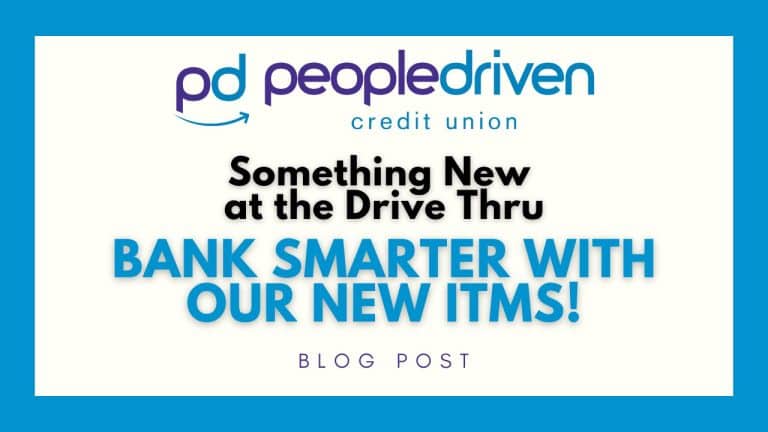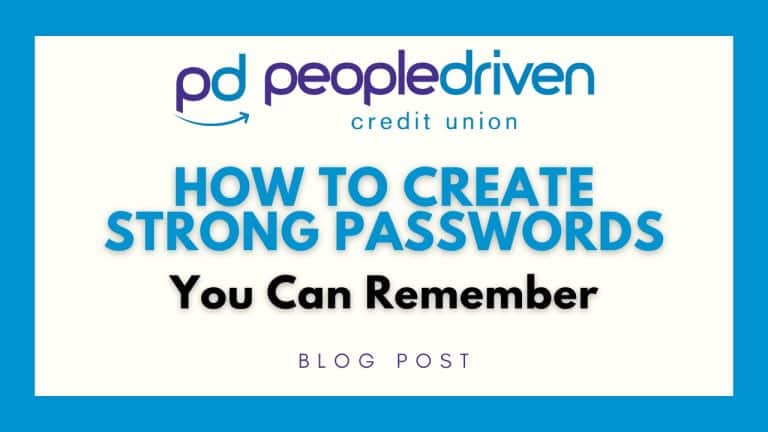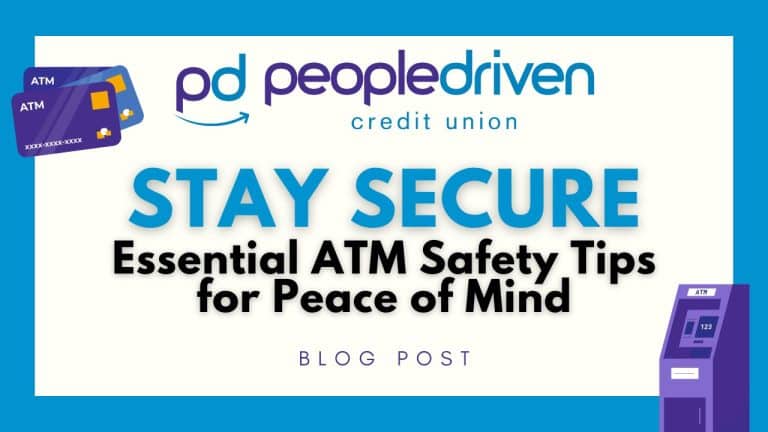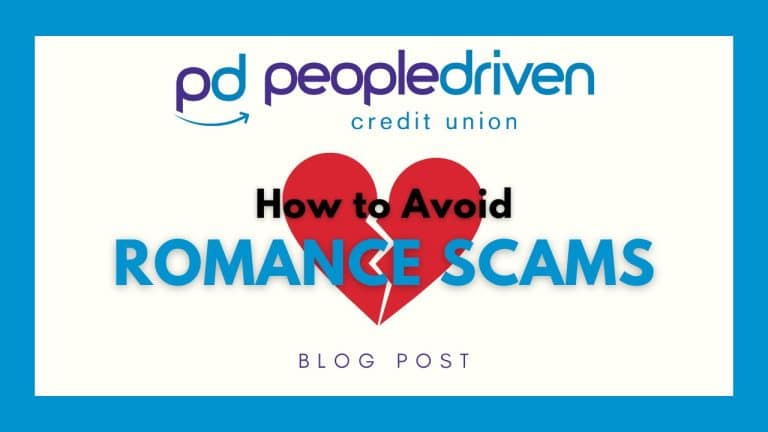People Driven Credit Union is dedicated to helping our members safeguard against banking fraud. Protecting your personal and financial information is paramount, especially in today’s digital age. Here, you’ll find valuable resources and tips on how to stay safe from online and offline scams. Learn about recognizing common fraud tactics, securing online banking credentials, and safeguarding sensitive information. Explore our articles and empower yourself with the knowledge to defend against fraud and preserve your financial security. Together, let’s ensure a safer banking experience for everyone.
Fraud Alert! |
|---|
| Be aware of recent fraud attempts in Metro Detroit, where scammers pose as representatives from financial institutions. They may contact you asking for sensitive information like debit/credit card numbers, PINs, online/mobile banking credentials, or one-time verification codes.
Stay safe: Don᾿t respond to unexpected requests via phone/text/email for your account number or personal information. People Driven Credit Union will never request your online banking credentials or one-time codes. It’s crucial to keep this information private. If you suspect any fraudulent activity, contact us immediately. |
Recent Fraud Alerts:
More Recent Fraud Alerts:
-
Amazon Prime Day Cyber Threats
Pay Attention to the Details When Shopping Online.
-
Signs A Scammer May Be Targeting You
Scammers work hard to win your trust, but they often give themselves away if you know what to look for.
-
Malware Attacks
A sophisticated malware used by various criminal groups to exploit mobile banking users.
-
Phishing Texts
PDCU will never ask for your personal or banking information via text message.
Tips to Protect Yourself
Identity thieves are trying to trick Americans into giving up their personal information to commit fraud. Everyone must keep their guard and be aware to combat identity theft. Important practices include:
- Don᾿t respond to unexpected requests for your account number or personal information.
- Don’t give out PINs or access codes to anyone, even people you know. You may trust them, but once that information is shared, you can’t control who else might find it.
- Validate all organizations before providing any personal information. Validate the organization by calling a validated phone number, not through a number they provide.
- Never click on unsolicited links unless you can verify the legitimate request.
- Keep your devices protected and up-to-date with security services.
The most common scams will target you through fake emails, texts, calls, letters, or even someone showing up at your front door. By knowing what to watch out for, we can help you identify fraud events before they happen.
Keep your account and identity information secure:
Go paperless e-Statements are generally more secure
Get a shredder for your home to destroy unnecessary printouts or mailings that include your information
Never write your PIN on your card
Use trusted online payment methods such as PayPal, Zelle®, or another known payment service.
Avoid sharing your online ID and Passcode.
Here is what you can do now:
Use our Online Banking Portal or the MyPDCU app. It’s the best way to stay on top of any suspicious account activity.
Check your contact information. You’re not the only one protecting your account. If we spot an issue, we want to get in touch with you quickly. Ensure your account information is current so we can alert you to potential fraud.
Create strong, unique passwords. Strong passwords are at least eight characters in length and comprised of numbers, symbols, and upper & lowercase letters. Use multifactor authentication when possible. Change your passwords regularly.
Protect your devices. Keep your phone, tablet, and computer updated with the latest browsers, operating systems, and antivirus software.
Your security is our top priority:
We strive to protect and secure your personal and financial information through responsible information collection and processing.
More Tips to keep your personal and financial information safe:
-
“Bank Jugging” Threatens Credit Union Member Security
Criminals target distracted individuals at branches or ATMs, following them and stealing valuables from their vehicles.
Occasionally, these criminals pretend to be helpful at ATMs, suggesting members use their tap card on deliberately obstructed machines, allowing the thief to withdraw funds afterward.
Our credit union is dedicated to enhancing member security through advanced technology and education. We’re working diligently to raise awareness of potential risks and encourage vigilance when interacting with strangers offering unsolicited advice. Your safety is our priority.
-
One common scam is to request payment for goods or services through a gift card. The thief will request that the buyer purchase a gift card and send them the card info as immediate payment.
They will seem nice and give you reasons why this is a legitimate transaction, but once they have the gift card code, they have your money, and you won’t receive the promised purchase!
-
Never cash a check for a stranger, especially if they ask you to give them all or some of the money back.
Your bank may give you the funds for the check, but when that check is returned as bad, you will be expected to pay it back in full.This is a common scam pulled on young people with no strikes against their credit, and they may be able to cash checks more efficiently. Sometimes, the young adults even know it is a scam but get talked into making quick cash.
Parents, warn your kids – this is a fast way to ruin your credit!
-
PDCU will never contact you and request you to provide your personal information.
- If we contact you, we may ask you to verify your identification that we provide.
- If you contact us, we may ask you to provide proof of identification.
Consider who is initiating the contact before you provide personal information.
-
Scammers may pose as government officials, law enforcement, or other known companies to steal your personal information. Always validate a person’s organization by calling them back through an official phone number, not one provided by the caller.
-
Look carefully at the URL in the link or email, even if it looks like a company you trust. URL links can be tricky. PayPal is not the same as PayPal. Look for minor differences that could signal a phony URL.
Sometimes, a link can look legit but be just text hiding a different URL. Right-click the link and check the “Properties” to see where it’s taking you.
When in doubt, contact the company another way.
-
Don’t click on the link if you’re not expecting communication from a company.
Please feel free to contact the company if you have any questions. -
Scammers may pose as an employee of a large telecommunications company or a technical support provider to tell you that your computer is experiencing technical problems.
They will ask for remote access to solve the problem before demanding that you buy software or pay a fee to fix the computer.
If you give a stranger remote access, they may be able to pull your personal information out of your computer records.
-
Even if you can trust someone you are wiring money to, verify the wiring instructions.
It is easy for someone to commit fraud by faking instructions to divert money into another account, or a typo you make in instructions may send the money to the wrong person.
-
One common tactic of any scam is to rush you into acting fast before you have time to think. Scammers typically demand immediate responses and payment. Sometimes, they even threaten law enforcement or legal action. It could be a scam if you feel threatened, pressured, rushed, or asked not to provide details to others or your bank about the reason for a transaction. Always ask us for help.
Safety and Security Videos
Watch these videos from our partners at BVS to help keep yourself safe from identity theft, fraud, and scammers.





